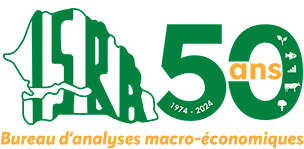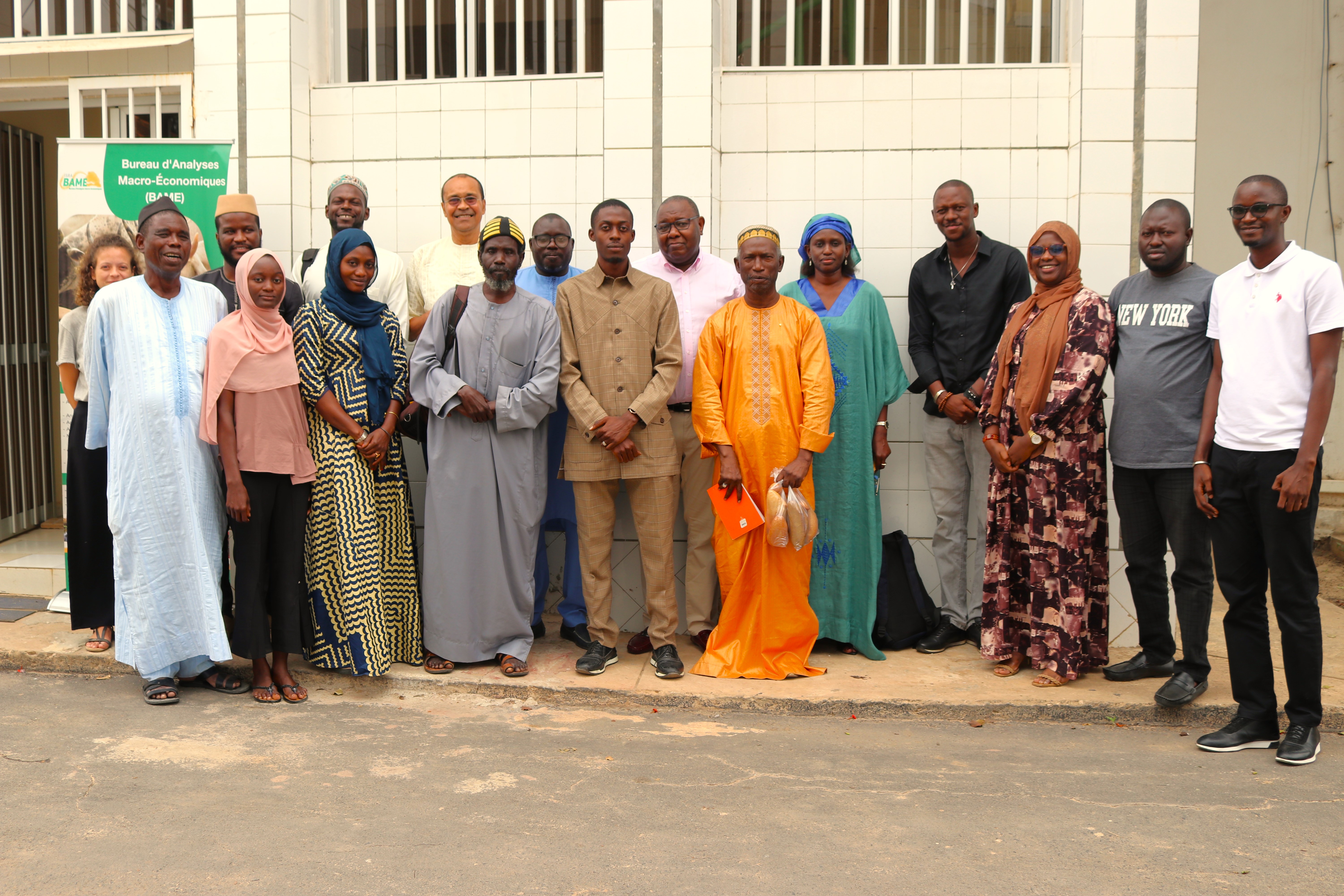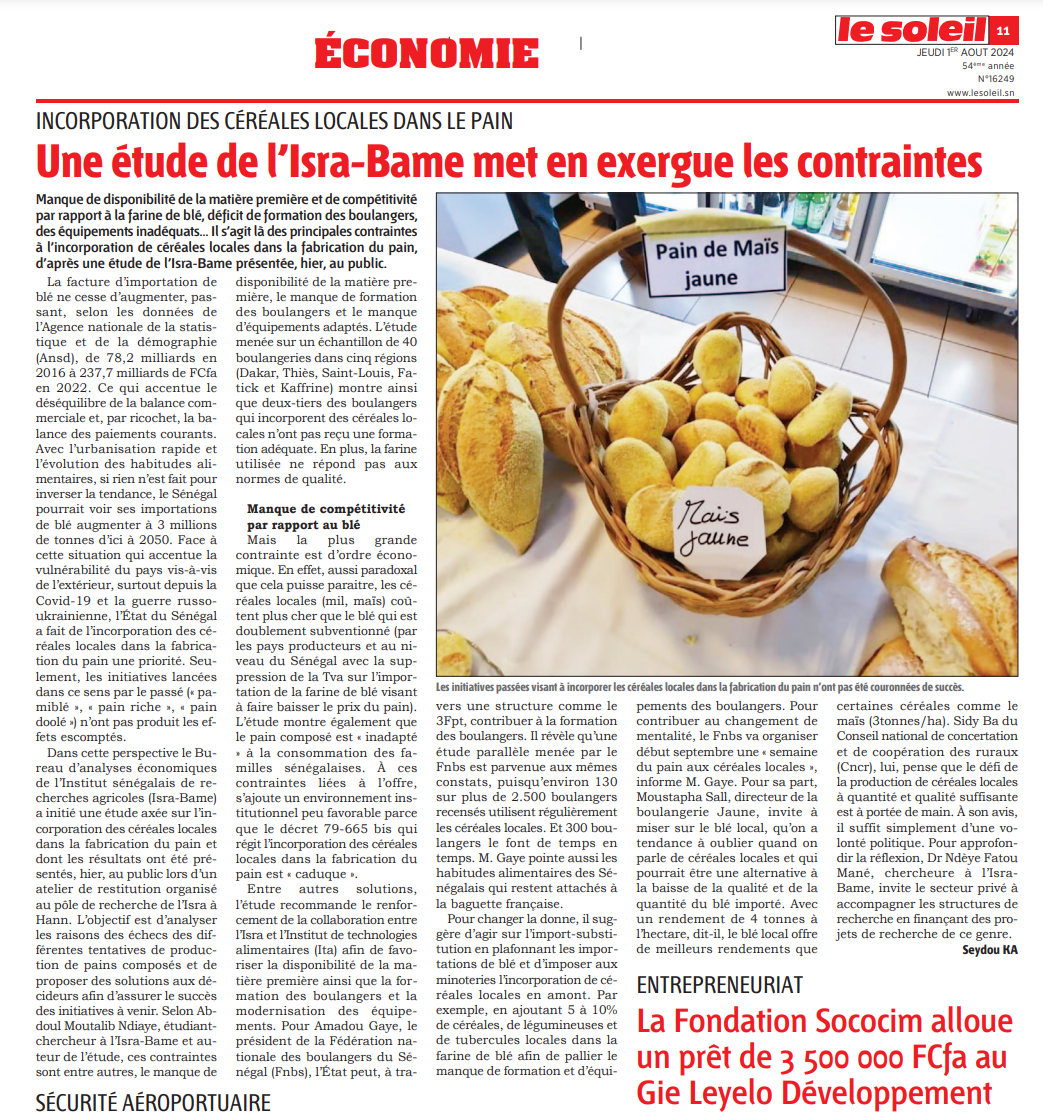Webinar (Study Restitution) on the constraints to the incorporation of local cereals in bread-making in Senegal
Publié le 6 août 2024
The bill for wheat imports continues to increase, from 78.2 billion in 2016 to 237.7 billion FCFA in 2022, according to data from the National Agency for Statistics and Demography (ANSD). This accentuates the imbalance in the trade balance and, by extension, the current account balance. With galloping urbanization and changing eating habits, if nothing is done to reverse the trend, Senegal could see its wheat imports increase to 3 million tons by 2050. Faced with this situation which increases the country’s vulnerability abroad, particularly since Covid-19 and the Russo-Ukrainian war, the State of Senegal has made the incorporation of local cereals in bread making a priority.
During three rounds of the clock (9 a.m. to 12 p.m.) the various stakeholders in the compound bread production sector discussed the research results of this study. This meeting was used to advocate for the urgency of integrating a program for the production of mixed breads into the national strategies of the new regime. The author of the study (Master 2 thesis) Abdou Moutalib Ndiaye identified some perspectives that could contribute to the use of local cereals.
The study was initiated following the 24th “Mardi du Bame” during which two themes were addressed : wheat production in Senegal and the incorporation of local cereals in bread production. The objective was to analyze the reasons for the failures of the various attempts to produce compound breads and to propose solutions to decision-makers in order to ensure the success of future initiatives.
? Relive online the debates on the constraints on the incorporation of local cereals in bread-making in Senegal on YouTube.
?? Here is a video of Abdoul Moutalib Ndiaye discussing his study ?
You will find, online, Mr Ndiaye’sfinal study thesis, the results of which were shared during this virtual meeting between sector players and decision-makers. ??
Family photos of the panelists and guests
Read in the press...
PRESS ARTICLE CONTENT...
The wheat import bill continues to increase, going from 78.2 billion in 2016 to 237.7 billion FCFA in 2022, according to data from the National Agency for Statistics and Demography (ANSD). This is accentuating the imbalance in the trade balance and, by extension, the current account balance. With rapid urbanization and changing eating habits, if nothing is done to reverse the trend, Senegal could see its wheat imports increase to 3 million tons by 2050. Faced with this situation, which increases the country’s vulnerability to the outside world, especially since Covid-19 and the Russo-Ukrainian war, the State of Senegal has made incorporating local cereals into bread making a priority. However, initiatives launched in this direction in the past (« pamiblé », « rich bread », « doolé bread ») have not produced the expected effects. In this perspective, the Economic Analysis Bureau of the Senegalese Institute of Agricultural Research (Isra-Bame) initiated a study focused on the incorporation of local cereals in the manufacture of bread, the results of which were presented yesterday to the public during a restitution workshop organized at the Isra research center in Hann. The objective is to analyze the reasons for the failures of the various attempts to produce compound breads and to propose solutions to decision-makers in order to ensure the success of future initiatives.
According to Abdoul Moutalib Ndiaye, a student researcher at Isra-Bame and author of the study, these constraints include, among others, the lack of availability of raw materials, the lack of training of bakers and the lack of suitable equipment. The study conducted on a sample of 40 bakeries in five regions (Dakar, Thiès, Saint-Louis, Fatick and Kaffrine) shows that two-thirds of bakers who incorporate local cereals have not received adequate training. In addition, the flour used does not meet quality standards.
But the biggest constraint is economic. Indeed, as paradoxical as it may seem, local cereals (millet, corn) cost more than wheat, which is doubly subsidized (by producing countries and in Senegal with the removal of VAT on the import of wheat flour aimed at lowering the price of bread). The study also shows that mixed bread is « unsuitable » for the consumption of Senegalese families. In addition to these supply-related constraints, there is an unfavorable institutional environment because Decree 79-665 bis, which governs the incorporation of local cereals in bread making, is « outdated ». Among other solutions, the study recommends strengthening collaboration between ISRA and the Institute of Food Technologies (ITA) in order to promote the availability of raw materials as well as the training of bakers and the modernization of equipment. For Amadou Gaye, the president of the National Federation of Bakers of Senegal (FNBS), the State can, through a structure like the 3FPT, contribute to the training of bakers. He reveals that a parallel study conducted by the FNBS reached the same conclusions, since approximately 130 out of more than 2,500 bakers listed regularly use local cereals. And 300 bakers do so from time to time. Mr. Gaye also points out the eating habits of the Senegalese who remain attached to the French baguette. To change the situation, he suggests acting on import-substitution by capping wheat imports and requiring flour mills to incorporate local cereals upstream.
For example, by adding 5 to 10% of local cereals, legumes and tubers to wheat flour in order to compensate for the lack of training and equipment for bakers. To contribute to changing mentalities, the Fnbs will organize a « local cereal bread week » at the beginning of September, informs Mr. Gaye. For his part, Moustapha Sall, director of the Jaune bakery, invites us to focus on local wheat, which we tend to forget when we talk about local cereals and which could be an alternative to the decline in the quality and quantity of imported wheat. With a yield of 4 tonnes per hectare, he says, local wheat offers better yields than certain cereals such as corn (3 tonnes/ha). Sidy Ba of the National Council for Consultation and Cooperation of Rural People (Cncr), for his part, believes that the challenge of producing local cereals in sufficient quantity and quality is within reach. In his opinion, all that is needed is political will. To further the reflection, Dr. Ndèye Fatou Mané, researcher at Isra-Bame, invites the private sector to support research structures by financing research projects of this kind. (Extract from the article in the Journal LE SOLEIL of August 1, 2024).





